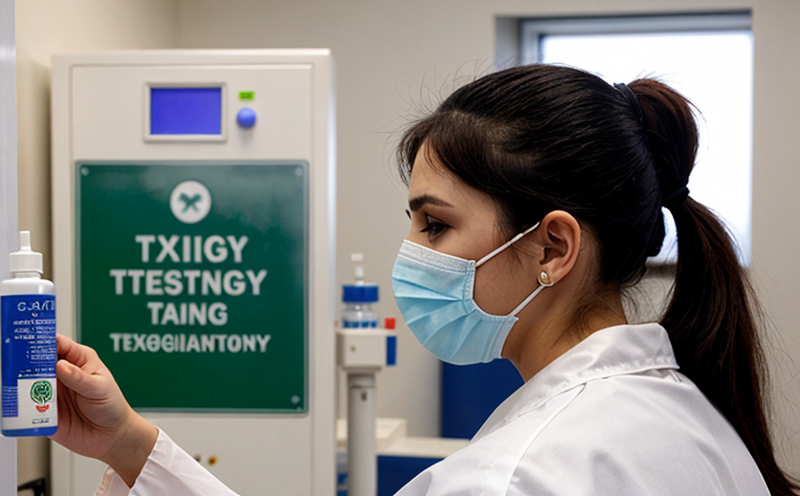Embryotoxicity Stem Cell Testing
The Embryotoxicity Stem Cell Testing service offered by our laboratory is a critical component in ensuring the safety and efficacy of pharmaceuticals before they reach the market. This testing method assesses the potential harm to developing embryos resulting from exposure to test compounds, which can inform the risk-benefit analysis for new drug candidates.
The use of embryotoxicity stem cell testing aligns with international standards such as OECD Guideline 414 and ISO/TS 22908. These guidelines provide a framework for identifying potential adverse effects on early-stage embryos, which is essential in the pharmaceutical industry to meet regulatory requirements and ethical considerations.
The process begins with obtaining embryonic stem cells from human donors or using pluripotent stem cells derived from induced pluripotent stem cell technology. The cells are then cultured under controlled conditions that mimic early embryo development stages. Exposure of these cells to potential toxicants simulates real-world scenarios, providing a predictive model for in vivo testing.
This method offers several advantages over traditional animal models, including reduced ethical concerns and more accurate predictions of human response. By using this approach, pharmaceutical companies can ensure they are addressing the most relevant endpoints while minimizing unnecessary animal use.
Our laboratory adheres to strict protocols to maintain consistent results across all tests. This includes rigorous quality control measures at every stage of the process, from cell culture maintenance to final endpoint analysis. The use of advanced imaging techniques such as time-lapse microscopy and confocal microscopy allows for precise monitoring of cellular responses.
The scope of our embryotoxicity stem cell testing goes beyond mere safety assessments; it also encompasses a comprehensive evaluation of developmental toxicity. This involves assessing the teratogenic potential, structural variations, functional impairments, and behavioral alterations caused by compound exposure during critical periods of organogenesis and neural development.
Our service is designed to meet the needs of various stakeholders within the pharmaceutical industry, including quality managers, compliance officers, R&D engineers, and procurement professionals. By providing reliable data on potential embryotoxic effects early in the drug discovery process, we help clients make informed decisions that balance innovation with safety.
Benefits
- Reduces ethical concerns compared to traditional animal models.
- Predicts human response more accurately.
- Complies with international standards like OECD Guideline 414 and ISO/TS 22908.
- Maintains consistency in results through rigorous quality control measures.
- Provides precise monitoring of cellular responses using advanced imaging techniques.
- Aids in making informed decisions that balance innovation with safety.
- Contributes to minimizing waste and resource consumption associated with traditional toxicity assessments.
Environmental and Sustainability Contributions
The use of embryotoxicity stem cell testing contributes significantly to environmental sustainability by reducing the need for animal models. This not only minimizes the ethical concerns often associated with animal testing but also reduces waste and resource consumption. By adopting this method, our laboratory helps pharmaceutical companies comply with increasing demands for more environmentally friendly practices in research and development.
The reduction in animal use is achieved through the efficient cultivation of embryonic stem cells and the precise application of test compounds. This approach ensures that only necessary resources are utilized, leading to a more sustainable testing process. Additionally, the data generated from these tests can help pharmaceutical companies design safer products without compromising on efficacy or innovation.
Our commitment to sustainability extends beyond just reducing animal use; it includes continuous improvement in laboratory practices and technology adoption. By staying at the forefront of scientific advancements, we ensure that our services remain both cutting-edge and environmentally responsible.
Competitive Advantage and Market Impact
The Embryotoxicity Stem Cell Testing service provided by our laboratory offers a competitive edge in the pharmaceutical market by providing high-quality, accurate data on potential embryotoxic effects. This early-stage assessment allows companies to identify and mitigate risks associated with new drug candidates more effectively.
By adhering strictly to international standards such as OECD Guideline 414 and ISO/TS 22908, our service ensures compliance with regulatory requirements and ethical considerations. This not only enhances the reputation of pharmaceutical companies but also helps them navigate complex regulatory landscapes more smoothly.
The use of advanced imaging techniques and rigorous quality control measures further reinforces our commitment to accuracy and reliability. These factors contribute significantly to the credibility of the data generated, which is crucial for making informed decisions in drug development.
Our service plays a pivotal role in driving innovation within the pharmaceutical industry by providing reliable information on potential embryotoxic effects early in the drug discovery process. This allows companies to focus their efforts on safer and more effective treatments without compromising on efficacy or safety.
The impact of this testing method is far-reaching, influencing not only individual companies but also contributing to broader trends towards more ethical and sustainable practices in pharmaceutical research and development.
Frequently Asked Questions
- Reduces ethical concerns compared to traditional animal models.
- Predicts human response more accurately.
- Complies with international standards like OECD Guideline 414 and ISO/TS 22908.





